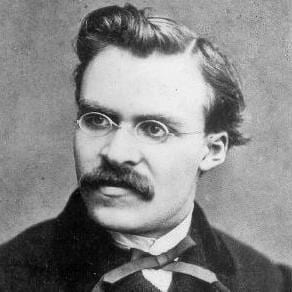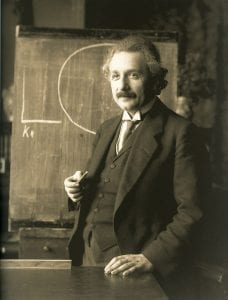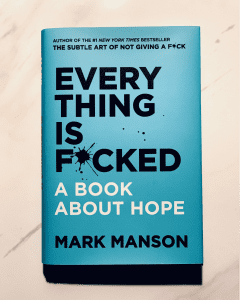Chances are you’ve experienced the feeling of hopelessness before. The dreary sense that everything you’re doing is worthless—that there’s just no point in trying anymore. Mark Manson’s Everything is F*cked is a book about hope and much, much more. Manson takes the reader into existentialist territory by first reflecting on what hope is and its relationship to meaning, and then expertly painting a picture of how hope fits into the world we live in today.
Mark’s writing style strikes a rare balance between witty humor and philosophical self-help. Almost creating his own genre, Manson maintains his genuine appreciation for comedy while bringing the reader life-changing information that is both discernible and interesting. Mark’s latest book is full of wisdom and is a timely piece considering the apparent lack of hope in today’s society. Here are a few of our favorite key lessons and timeless quotes from Everything is F*cked.
3 Key Takeaways from Everything is F*cked
We all have things we hope for. Some hope for success. Some hope for a second chance. Some merely hope to have food on the table. No matter our circumstances, we all hope for a better life. But before we can build a strong sense of hope, we have to have a solid foundation. In the book Everything is F*cked, Manson takes the reader on a tour of all things “hope.” Where it comes from, how we build it, how we lose it, and of course, all the while acknowledging that our existence means nothing—which is why we need hope in the first place. The following are three practical ideas that shed light on how we currently view the world concerning hope.
1) The Uncomfortable Truth
In Everything is F*cked, Manson argues that hope is the coal that keeps the existence train rolling. It’s hope that gives a reason to continue on and find meaning in a seemingly meaningless existence. The message is simple, though Manson humorously expands on it by writing that if he were a barista at Starbucks, he would happily write the following message on every customer’s morning cup:
One day, you and everyone you love will die. And beyond a small group of people for an extremely brief period of time, little of what you say or do will even matter. This is the Uncomfortable Truth of life. And everything you think or do is but an elaborate avoidance of it. We are inconsequential cosmic dust, bumping and milling about on a tiny blue speck. We imagine our own importance. We invent our purpose—we are nothing. Enjoy your fucking coffee.
Of course, the message is long and would undoubtedly lead to longer wait times. But it’s also profound. It’s Manson’s own take on the philosophy of memento mori. We’re all guilty of fabricating our own meaning. We assign ourselves goals, aspirations, anything that gives us something to look forward to. What keeps us getting out of bed every morning? The hope that we’ll actually achieve those goals.
At first glance, Everything is F*cked almost appears to be an argument for nihilism, the basic assertion that life is utterly meaningless. But Manson is actually insisting the opposite. Once we acknowledge this Uncomfortable Truth, that our existence is objectively insignificant, then we can slowly begin to build a hopeful and meaningful life. Not just any kind of hope or meaning, Manson adds, but one that is sustainable and benevolent in nature. Meaning is derived from our subjective hopes—what we’re trying to do and accomplish. The harder we look for an objective meaning to life, the more we’ll struggle and lose hope altogether.
2) The Classic Assumption
For thousands of years, philosophers and brilliant thinkers alike have asserted that reason must rule over our desires. As Manson points out, people like Kant and Freud both preached this in their works. But somehow, after years and years of being told that reason is God, we’ve confused ridding ourselves of desire with ridding ourselves of emotion entirely. The problem with such thinking is easily seen when applied to specific groups of people. For example, those who are obese are ridiculed for lacking self-control with food. Society looks down upon them for not valuing reason (the idea that you should eat healthy to promote longevity) and over-valuing desire (the compulsion to stop at a fast-food drive-thru whenever you feel like it). As a society, we’ve become emotion-shamers, according to Manson. “We see succumbing to our emotional impulses as a moral failing. We see a lack of self-control as a sign of a deficient character. Conversely, we celebrate people who beat their emotions into submission.”
The truth is that we need more than willpower or over-exaggerated reasoning to achieve real self-control. Our brains are separated into two parts with respect to consciousness: the thinking brain and the feeling brain. The thinking brain is objective and factual, while the feeling brain is subjective and relative. To make effective decisions across the board, we must utilize both aspects of conscious thinking. Otherwise, we’d be ridiculously cold and calculated with rationality, or an emotional train wreck that ignores objective truth and indulges every impulsive desire. Manson’s concept of the Classic Assumption rings true in all of our lives. All of us—Stoics, philosophers, self-help seekers, and regular folks—have misunderstood what our emotions can do for us. We’ve all been caught up in the battle between the thinking brain and the feeling brain. While logical reasoning certainly has its value in some parts of every decision, it cannot be 100% relied upon for every single decision. There’s a reason why feeling emotion has survived thousands of years of evolution and natural selection. It’s because we need it. We can’t successfully interact with others or live meaningful lives without the ability to feel.
So, where does hope come in? Hopelessness is the result of an uneducated feeling brain that has adopted and accepted poor value judgments about itself and the world, Manson writes. Put simply, somewhere along the line, in the trenches of life, something horrible happened to us. It robbed us of hope. And while we may have been entirely justified in losing hope, we failed to recognize that those experiences are still robbing us.
3) Newton’s Laws of Emotion
The name Isaac Newton is one of the most recognizable in history, certainly in the field of science. While there’s an enormous body of research and biographies on Newton, Manson creatively depicts the legendary scientist in an entirely new and entertaining way. Newton was known for developing his three laws of motion. Manson asks his readers, for a moment, to pretend that we live in a parallel universe where Newton is obsessed with observing his own psychological tendencies rather than the natural world, or as Manson lovingly refers to him, “Emo-Newton.” Instead of the three laws of motion, Newton is known in this parallel universe for coming up with the three laws of emotion. They are:
- For Every Action, There is an Equal and Opposite Emotional Reaction
- Our Self-Worth Equals the Sum of Our Emotions Over Time
- Your Identity Will Stay Your Identity Until a New Experience Acts Against It
Newton’s first law of emotion describes our immediate reaction to things as they happen to us. Take, for example, getting punched in the face. As soon as we get hit, we begin our response. It could be hitting the person back, calling the police, or verbally reprimanding the person. Regardless of our response, Manson writes, we feel a rush of negative emotion in these moments. This is where most of us tend to make mistakes. We make inaccurate judgments and act impulsively. The benefit, though, comes once we’re able to reflect on our responses. We grow by acknowledging where we came up short. And growth builds upon our framework of hope.
The second law of emotion focuses less on how we respond to things, but rather how these things affect our sense of self-worth. As life goes on and we experience more and more, we start to make judgments about ourselves based on what happens to us. Life puts us through the wringer and kicks us when we’re down. After a while, we eventually conclude that we deserve it. Of course, this works in the reverse as well. Say that we’re receiving praise constantly—even when we don’t deserve it—our self-worth will skyrocket, and we’ll have an inflated sense of self-worth. Newton’s second law of emotion highlights the importance of what we tell ourselves AND how we view ourselves.
The third and final law is perhaps the most important of the three. Manson writes that values aren’t just a collection of feelings, they’re also stories or narratives. And once we build these narratives in our minds, we cling to them with all our might. They become our identity. But, as Manson points out, there’s a downside to this type of thinking. When we adopt such narratives, we react emotionally to them as if they are permanently ingrained in us. If our narrative is challenged by someone, we become defensive and emotionally reactive. As Manson perfectly explains, “We react to protect the metaphysical body just as we protect the physical.” The longer we hold onto these values or narratives, the more fundamental they become to the way we view ourselves and the world.
Unfortunately, the way we see the world isn’t always the way things actually are. Our childhood, our experiences—everything we’ve ever encountered has caused us to make value judgments and construct narratives about ourselves that help us navigate the unknown. The third law that Manson creatively describes is a sobering reminder that while values and narratives are important, we ought to spend some time making sure that those narratives continue to build us up rather than break us down. They should give us hope and meaning, not anxiety and a sense of utter nihilism.
3 Favorite Examples from Everything is F*cked
The best part of Manson’s books is the level of research that goes into them. And somehow, the content is easily read and beyond entertaining. A secret underground resistance, the decaying mind of a brilliant man, and the earth-shattering discoveries of a famous scientist are all case studies that Manson uses to illustrate the various ins and outs of hope. Here are three of our favorite examples from Everything is F*cked.
1) Witold Pilecki

Witold Pilecki was many things—a father, a husband, a soldier, and most famously, the only known person to ever sneak into Auschwitz, one of the most infamous Nazi death camps. Pilecki’s incredible story begins in the Polish-Soviet War of 1918. Pilecki, a young man and decorated officer, survived the war and moved to the Polish countryside. He had a wife, two kids, and a seemingly perfect life, until Hitler rose to power and blitzkrieged more than half the country. In just under a month, Poland had lost virtually all of its territory. Seeing his country slip into the abyss, Pilecki and several other officers decided to form an underground resistance group, the Secret Polish Army.
In the spring of 1940, the Secret Polish Army received intelligence that the Germans were building a massive prison complex. This new complex was to be named Auschwitz. By the summer of 1940, thousands of prominent Polish citizens and government officials were vanishing. Pilecki and his cohorts suspected that Auschwitz was likely the main culprit behind the disappearances. Pilecki, on his own free will and accord, volunteered to sneak into Auschwitz. He would allow himself to be arrested by the SS, and begin gathering intelligence on the conditions and inner workings of the Nazi complex.
Once Pilecki actually got there, he realized how truly horrific circumstances were inside the camp. For two years, Pilecki would build out an intelligence network inside Auschwitz. He would deliver messages to outside partners, some of the intelligence being so critical that it would pass the desks of Eisenhower and Churchill. The problem? Nobody believed Pilecki. No one could fathom how utterly hopeless the situation was. After two years at Auschwitz, Pilecki would escape from the death camp.
After the war, Pilecki continued to spy. Only this time, it was on the Soviets. In 1947 Pilecki was captured, tortured, and found guilty of multiple charges, including espionage and treason. In his final words just before being put to death, Pilecki would say this:
I have tried to live my life such that in the hour of my death I would feel joy rather than fear.
Pilecki’s story is one of the most powerful to come out of WWII. One man, armed with nothing but love for his country and hope for a better future, was able not only to sneak into a Nazi death camp, but to escape it as well. It was hope that forced Pilecki beyond the gates of Auschwitz and into what easily could have been his demise. It was hope that drove him to spread the word of atrocities being committed by the Germans. Witold Pilecki used his hope as a burning flame within; an undying source of fuel to keep pushing. It would keep him serving his country and the world until his final moments. He built an unbreakable system of hope, and Manson uses Withold’s incredible story to set a hopeful tone for the rest of Everything is F*cked.
2) Friedrich Nietzsche

Friedrich Nietzsche is one of the most notable philosophers of all time. There are hundreds of books and scholarly essays about his work. And Manson relates a significant story about Nietzsche in Chapter 5 of Everything is F*cked.
In the final years of his life, Nietzsche was cared for by numerous women, including his dear friend Meta von Salis. Meta first met Nietzsche at a dinner party, and the two remained close friends until his death. One day, while out on a walk around the lake near his home, Nietzsche began to struggle, both physically and mentally. Years of battling mental illness had taken its toll on the brilliant thinker. As Meta walked alongside him, Nietzsche broke into a tirade of philosophical nonsense. She tried to calm him down and urged him to return home, but he refused. Just as Meta began to walk away, feeling hopeless, she heard Nietzsche say, “Man is a rope, tied between beast and superman—a rope over an abyss. What is great in man is that he is a bridge and not a goal: what can be loved in man is that he is an overture [to something greater.]”
The words he spoke that day left her speechless. The idea of mankind as an overture to something greater is what inspired Meta to continue her work as a champion of feminism and women’s liberation. The words Nietzsche spoke brought her hope. But it’s important to note that Nietzsche was more inclined to support the acceptance of one’s reality rather than hope itself. For him, hope had to be surpassed by what he called Amor Fati, a love of fate. To love our fate is to accept life and all its experiences unconditionally; love, pain, joy, despair… all of it. In learning to love what happens to us, we deny the world and everyone else the power to make us feel hopeless.
3) Albert Einstein

Before Albert Einstein famously proved that time and space were not universal constants, the scientific community was convinced that they were immutable. They were, according to scientists of the time, the metrics by which everything else was measured. But Einstein and his genius mind proved the scientific consensus wrong. Manson uses Einstein’s groundbreaking discovery to illustrate the point that our assumptions of what is universally constant can be incorrect. Happiness, for example, is often thought to be a universal constant—that there is an objective state of happiness that can be achieved by anyone. However, what is happiness to one person may be absolutely dull or seemingly irrelevant to someone else. Because of this, Manson argues that the pursuit of happiness is futile.
Instead of pursuing happiness, we must accept that the one universal constant is pain. Pain is everywhere. In our relationships, our mistakes, our shortcomings. But with pain comes growth, and the only thing we should worry about is making sure we embrace the pain as an opportunity to find value and meaning. Manson describes this perfectly when he advises, “When we deny ourselves the ability to feel pain for a purpose, we deny ourselves the ability to feel any purpose in our life at all.”
Hope is more than a feeling or emotion. It’s the source in which we all can find meaning in our objectively meaningless existence. For Pilecki, it was hope for a better country that kept him in the fight against evil. For Meta, it was the hope that women would be rise above the oppression that had been forced upon them for so long. The commonality amongst us all is, and will always be this: The hope for a better future.
12 Best Quotes from Everything is F*cked
“No, the opposite of happiness is hopelessness, an endless gray horizon of resignation and indifference. It’s the belief that everything is fucked, so why do anything at all?”
“By experiencing our hopes, we lose them. We see that our beautiful visions for a perfect future are not so perfect, that our dreams and aspirations are themselves riddled with unexpected flaws and unforeseen sacrifices. Because the only thing that can ever truly destroy a dream is to have it come true.”
“Hopelessness is the root of anxiety, mental illness, and depression. It is the source of all misery and the cause of all addiction.”
“Because pain is the universal constant of life, the opportunities to grow from that pain are constant in life. All that is required is that we don’t numb it, that we don’t look away. All that is required is that we engage it and find the value and meaning in it.”
“Freedom itself demands discomfort.”
“They forgot that the world doesn’t run on information. People don’t make decisions based on truth or facts. They don’t spend their money based on data. They don’t connect with each other because of some higher philosophical truth. The world runs on feelings.”
“Self-control is an illusion. It’s an illusion that occurs when both brains are aligned and pursuing the same course of action.”
“You must love someone without expecting anything in return; otherwise it’s not truly love. You must respect someone without expecting anything in return; otherwise you don’t truly respect him. You must speak honestly without expecting a pat on the back or a high-five or a gold star next to your name; otherwise you aren’t truly being honest.”
“I have tried to live my life such that in the hour of my death I would feel joy rather than fear.”
“People now had a ton of free time to sit and think and worry about all sorts of existential shit that they had never considered before.”
“The only true form of freedom, the only ethical form of freedom, is through self-limitation. It is not the privilege of choosing everything you want in your life, but rather, choosing what you will give up in your life.”
“The only true meaning in existence is the ability to form meaning.”
